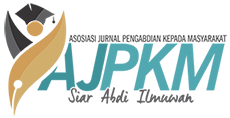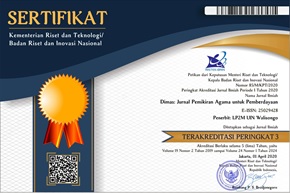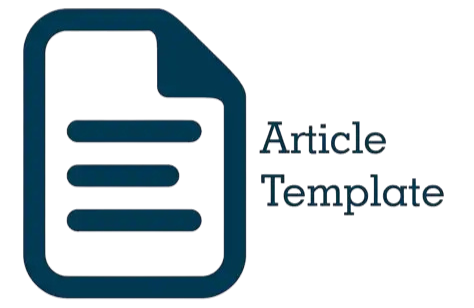Training and Assistance in Article Writing for Sinta Accredited Journals for Wonosobo Science MGMP
DOI:
https://doi.org/10.21580/dms.v24i2.23209Keywords:
teacher professional, scientific article, Sinta accredited journal, Participatory Action Research (PAR), writing competenceAbstract
This service activity aims to improve teacher competence in writing scientific articles according to Sinta-accredited journal standards. Using the Participatory Action Research (PAR) method, this program involves a partnership with the Wonosobo Science MGMP in intensive training and mentoring. The focus of activities includes improving understanding of the structure of scientific articles, from writing abstracts to compiling bibliographies using Mendeley. The program results showed a significant increase in teachers' motivation and writing competence, as evidenced by producing five articles successfully submitted to Sinta 2 and 3 accredited journals. Participant satisfaction surveys showed overwhelmingly positive assessments, with most responses in the excellent and sound categories. The success of this program highlights the importance of intensive mentoring in teacher professional development, particularly in the aspects of research and scientific publications. Recommendations for future program development include expanding coverage, strengthening institutional collaboration, and developing a digital platform to support program sustainability. This program has the potential to have a long-term impact on the quality of education through improving teachers' research and publication capacity, instilling confidence and optimism in the audience.
Downloads
References
Afandi, A., Laily, N., Wahyudi, N., & Nurdiyanah. (2022). Metodologi Pengabdian Masyarakat. Direktorat Pendidikan Tinggi Keagamaan Islam Direktorat Jenderal Pendidikan Islam Kementerian Agama RI.
Cahyono, E., Rusilowati, A., Sumarni, W., Harjito, & Kasmui. (2024). Upaya Meningkatkan Kompetensi Profesional Guru Melalui Pendampingan Penyusunan Proposal Penelitian dan Artikel Tulis Ilmiah. Aksiologiya: Jurnal Pengabdian Kepada Masyarakat, 8(1), 147–162.
Gunawan, I. (2013). Metode Penelitian Kualitatif. In Universitas Negeri Malang. Universitas Negeri Malang. http://fip.um.ac.id/wp-content/uploads/2015/12/3_Metpen-Kualitatif.pdf
Jumini, S., Hanifah, D. P., Aryati, D., & Jannata, T. (2024). Pendampingan Pendidikan Anak di Era Digital pada PKK Desa Krumpakan. 3, 22–30. https://doi.org/10.46843/jmp.v3i1.295
Komara, A. (2017). Menulis Artikel dan Karya Ilmiah. LPMP Jateng.
Noorjannah, L. (2014). Pengembangan Profesionalisme Guru Bagi Guru Profesional di SMA Negeri 1 Kauman Kabupaten Tulungagung. Jurnal Humanity, 10(1), 97–114. https://ejournal.umm.ac.id/index.php/humanity/article/view/2459
Peraturan Menteri Pendayagunaan Aparatur Negara dan Reformasi Birokrasi Republik Indonesia Nomor 1 Tahun 2023 Tentang Jabatan Fungsional, Kementerian Pendayaangunaan Aparatur Negara dan Reformasi Birokrasi RI 1 (2023).
Rahmat, A., & Mirnawati, M. (2020). Model Participation Action Research dalam Pemberdayaan Masyarakat. Aksara: Jurnal Ilmu Pendidikan Nonformal, 06(01), 62–71.
Setiawan, I. N. A. F. (2020). Era Kekinian Publikasi Open Journal Systems dan Perancangan Identitas Visual. Jurnal Bali Membangun Bali, 1(1), 1–18. https://doi.org/10.51172/jbmb.v1i1.104
Ula, M., Kesuma Dinata, R., Bintoro, A., & Fuadi, W. (2023). Meningkatkan Penulisan Karya Tulis Ilmiah dan Publikasi Guru di SMA Negeri 1 Lhokseumawe. Jurnal Malikussaleh Mengabdi, 2(1), 2829–6141.
Downloads
Published
Issue
Section
License
Copyright (c) 2024 Dimas: Jurnal Pemikiran Agama untuk Pemberdayaan

This work is licensed under a Creative Commons Attribution-ShareAlike 4.0 International License.
Copyright
The copyright of the received article shall be assigned to the journal as the publisher of the journal. The intended copyright includes the right to publish the article in various forms (including reprints). The journal maintains the publishing rights to the published articles. Therefore, the author must submit a statement of the Copyright Transfer Agreement.*)
Licensing

This work is licensed under a Creative Commons Attribution-ShareAlike 4.0 International License.
In line with the license, authors are allowed to share and adapt the material. In addition, the material must be given appropriate credit, provided with a link to the license, and indicated if changes were made. If authors remix, transform or build upon the material, authors must distribute their contributions under the same license as the original.
_______
*) Authors whose articles are accepted for publication will receive confirmation via email and send a Copyright Transfer Agreement.









